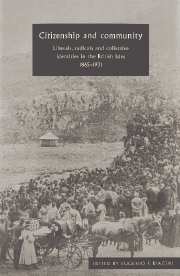 Citizenship and Community
Citizenship and Community Book contents
- Frontmatter
- Contents
- List of contributors
- Acknowledgements
- Introduction: Citizenship, liberty and community
- Part I Citizenship, populism and liberalism
- Part II Economic democracy and the ‘moral economy’ of free trade
- Part III Democracy, organicism and the challenge of nationalism
- 10 Land, religion and community: the Liberal Party in Ulster, 1868–1885
- 11 Nationalising the ideal: Labour and nationalism in Ireland, 1909–1923
- 12 Land, people and nation: historicist voices in the Highland land campaign, c. 1850–1883
- 13 The Welsh radical tradition and the ideal of a democratic popular culture
- Part IV Consciousness and society: the ‘peculiarities of the British’?
- Index
10 - Land, religion and community: the Liberal Party in Ulster, 1868–1885
Published online by Cambridge University Press: 16 September 2009
- Frontmatter
- Contents
- List of contributors
- Acknowledgements
- Introduction: Citizenship, liberty and community
- Part I Citizenship, populism and liberalism
- Part II Economic democracy and the ‘moral economy’ of free trade
- Part III Democracy, organicism and the challenge of nationalism
- 10 Land, religion and community: the Liberal Party in Ulster, 1868–1885
- 11 Nationalising the ideal: Labour and nationalism in Ireland, 1909–1923
- 12 Land, people and nation: historicist voices in the Highland land campaign, c. 1850–1883
- 13 The Welsh radical tradition and the ideal of a democratic popular culture
- Part IV Consciousness and society: the ‘peculiarities of the British’?
- Index
Summary
Throughout the nineteenth century, economic and political power in rural Ireland was concentrated in the hands of wealthy landowners and their political patrons in the Conservative and Whig parties. However, from 1868, this political status quo was effectively challenged by Liberals in Ulster and Nationalists in the rest of Ireland. The Liberals gave a political lead to tenants in rural Ulster, who sought redress of their economic grievances through grassroots involvement in politics – the core of Gladstonian liberalism. There was considerable sympathy for the plight of Irish tenants in British radical circles. They supported Irish demands for the abolition of laws which upheld religious and economic inequality, hoping this would reconcile Irish Protestants and Catholics and strengthen Ireland's place within the Union. Liberals in Ulster agreed with this analysis of Ireland's problem. They appealed to tenants as the ‘ambassadors of metropolitan Gladstonianism … [and] … presented themselves as … a direct channel of appeal to the most powerful of all potential allies – a metropolitan government’.
In this way the party made a considerable impact in Ulster elections between 1868 and 1880. At the height of their popularity, by exploiting tenant dissatisfaction at conditions in the countryside, they represented nearly half the rural constituencies of Ulster. However the Liberals failed to sustain a populist movement when faced with political competition from Celtic nationalism and a democratising Conservative Party. This chapter will analyse how the entering of the national question into Ulster politics adversely affected the ability of the Liberal Party to sustain its political representation in rural Ulster.
- Type
- Chapter
- Information
- Citizenship and CommunityLiberals, Radicals and Collective Identities in the British Isles, 1865–1931, pp. 253 - 275Publisher: Cambridge University PressPrint publication year: 1996
